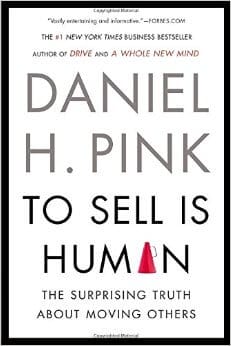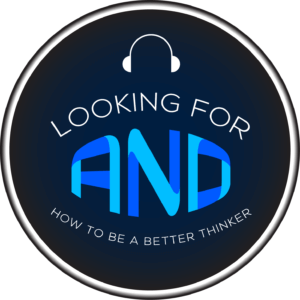When I run workshops on the topic of building resilience, we first talk about the science and the benefits of being more resilient. I usually ask the group to identify the one benefit from a list on my PowerPoint slide that is most important to them. Typical answers include: Increased productivity, More meaningful interpersonal relationships, and Increased appreciation for life. Then, I ask, “How many of you are in sales?” Usually, no one raises their hand since my classes are mostly full of project managers, customer service agents, financial analysts, executive assistants and human resources professionals. “What if I told you that you were all in sales?” I say and the heads begin to nod. We sell ourselves every day – performance reviews, getting others to comply to our wishes, and so on. Because of this, To Sell Is Human by Daniel Pink is a must-read for everyone who gets this newsletter.
Pink, the author of Drive: The Surprising Truth About What Motivates Us and A Whole New Mind: Why Right-Brainers Will Rule the Future, has followed up two great books with what I believe is his most practical piece. He also argues that ‘we are all in sales’ and that getting better at it is as easy as ABC: Attunement, Buoyancy and Clarity.
Pink defines Attunement as the ability to take someone else’s perspective. This seems simple enough and there are several counterintuitive principles for achieving this. Imagine that the forefinger on your dominant hand is a magic marker…now, draw a capital E on your forehead.
How did you draw the E? Did you draw it so that you could read it or did you draw it for others to read it? Those who draw the E for themselves tend to focus on their point of view when confronted with unusual or complex situations. Those who draw the E for others benefit are more likely to take the perspective of others by stepping outside of their own experience to see it differently – an important skill in working with others.
[polldaddy poll=9394640]
Other tips for being more attuned to those around you:
- Increase your power in the relationship by reducing it. Those in more formal positions of power are less likely to see things from others’ points of view. Simply assume that you are NOT the one with power.
- Don’t be afraid to empathize with those around you. Too often we try to take the cold approach to negotiations and worry about becoming attached to the other party. Empathy is simply understanding and sharing someone else’s emotions. Taking the time to understand someone better opens up a negotiation to more creative solutions. (For a great article on the difference between empathy and sympathy, click here.)
- Don’t worry about being an introvert or an extrovert. Just worry about being extreme in either case. It turns out that ‘ambiverts,’ those people who can switch between the two personality traits are better at shifting their behavior to match the other person.
Pink talks about one of my favorite topics (resilience) when he writes about Buoyancy. In typical Pink fashion, there are three components…
- Before – Resilient people, he argues, don’t pump themselves up with positive self-talk. Instead, they ask themselves some questions that allow them to prepare for what’s ahead. These questions elicit strategies that help them prepare for various obstacles that may arise.
- During – Injecting positive emotions into an interaction increases the chance of a sale. According to some selective research, higher levels of positive affect by the presenter led to more favorable ratings.
- After – Pink calls upon the research of Martin Seligman with regard to explanatory style. Pessimistic thinkers tend to explain bad events by saying it was all their fault (Personal), things will never change (Permanent) and that they affect every part of their lives (Pervasive). The more optimistic thinker is more likely to have a style that recognizes how others contributed to the bad event, how it is probably temporary and how it is isolated to one area of their lives.
Finally, Pink says that the best salespeople use Clarity to help others see their issues in more revealing ways AND to identify problems that they didn’t even realize they had. And, the “right” problems are a salesperson’s best friend. These problems are best uncovered by being proficient at asking questions and curating data. The top salespeople may not be best at solving problems but they are excellent at helping others find problems.
This is consistent with my experience in sales. When I do my best at listening, being present and asking good questions, prospective clients make the decision themselves. I have never believed that I could change someone’s mind – the best clients pick you when you help them see their own situation with a new set of eyes.
Now, if I could only get my kids to make dinner and do the laundry…



